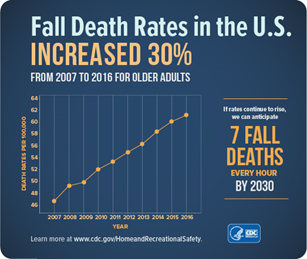Some information about old people falling down
Each year, millions of older people—those 65 and older—fall. In fact, more than one out of four older people falls each year, but less than half tell their doctor. Falling once doubles your chances of falling again.

Many Older Adults Fear Falling
The fear of falling becomes more common as people age, even among those who haven't fallen. It may lead older people to avoid activities such as walking, shopping, or taking part in social activities.
But don't let a fear of falling keep you from being active. Overcoming this fear can help you stay active, maintain your physical health, and prevent future falls. Doing things like getting together with friends, gardening, walking, or going to the local senior center helps you stay healthy. The good news is, there are simple ways to prevent most falls.
Causes and Risk Factors for Falls
Many things can cause a fall. Your eyesight, hearing, and reflexes might not be as sharp as they were when you were younger. Diabetes, heart disease, or problems with your thyroid, nerves, feet, or blood vessels can affect your balance. Some medicines can cause you to feel dizzy or sleepy, making you more likely to fall. Other causes include safety hazards in the home or community environment.
Scientists have linked several personal risk factors to falling, including muscle weakness, problems with balance and gait, and blood pressure that drops too much when you get up from lying down or sitting (called postural hypotension). Foot problems that cause pain and unsafe footwear, like backless shoes or high heels, can also increase your risk of falling.
Confusion can sometimes lead to falls. For example, if you wake up in an unfamiliar environment, you might feel unsure of where you are. If you feel confused, wait for your mind to clear or until someone comes to help you before trying to get up and walk around.
Some medications can increase a person's risk of falling because they cause side effects like dizziness or confusion. The more medications you take, the more likely you are to fall.
What You Can Do to Prevent Falls
Falls can be prevented. These are some simple things you can do to keep yourself from falling.
Talk to Your Doctor
l Ask your doctor or healthcare provider to evaluate your risk for falling and talk with them about specific things you can do.
l Ask your doctor or pharmacist to review your medicines to see if any might make you dizzy or sleepy. This should include prescription medicines and over-the counter medicines.
l Ask your doctor or healthcare provider about taking vitamin D supplements.
Do Strength and Balance Exercises
Do exercises that make your legs stronger and improve your balance. Tai Chi is a good example of this kind of exercise.
Have Your Eyes Checked
Have your eyes checked by an eye doctor at least once a year, and be sure to update your eyeglasses if needed.
If you have bifocal or progressive lenses, you may want to get a pair of glasses with only your distance prescription for outdoor activities, such as walking. Sometimes these types of lenses can make things seem closer or farther away than they really are.
Make Your Home Safer
l Get rid of things you could trip over.
l Add grab bars inside and outside your tub or shower and next to the toilet.
l Put railings on both sides of stairs.
l Make sure your home has lots of light by adding more or brighter light bulbs.
l Keep items you use often in cabinets you can reach easily without using a step stool.
l Use non-slip mats in the bathtub and on shower floors.
References
1. Bergen G, Stevens MR, Burns ER. Falls and Fall Injuries Among Adults Aged ≥65 Years — United States, 2014. MMWR Morb Mortal Wkly Rep 2016;65:993–998. DOI: http://dx.doi.org/10.15585/mmwr.mm6537a2
2. Stevens JA, Ballesteros MF, Mack KA, Rudd RA, DeCaro E, Adler G. Gender differences in seeking care for falls in the aged Medicare Population. Am J Prev Med 2012;43:59–62.
3. O’Loughlin J et al. Incidence of and risk factors for falls and injurious falls among the community-dwelling elderly. American journal of epidemiology, 1993, 137:342-54.
4. Centers for Disease Control and Prevention,Facts About Falls.https://www.cdc.gov/falls/facts.html.Accessed 8 April 2022.
5. U.S. Department of Health & Human Services,Prevent Falls and Fractures.https://www.nia.nih.gov/health/prevent-falls-and-fractures.Accessed 8 April 2022.
 简体中文
简体中文  English
English  日本語
日本語 